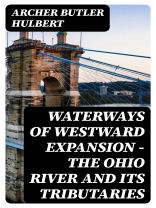In ‘Waterways of Westward Expansion – The Ohio River and its Tributaries, ‘ Archer Butler Hulbert meticulously examines the critical role of the Ohio River and its tributaries in the broader narrative of American westward expansion. Through a combination of historical analysis and vivid storytelling, Hulbert elucidates how these waterways served as conduits for exploration, commerce, and settlement, ultimately shaping the American frontier. His literary style combines rigorous research with engaging prose, making the text accessible to both scholars and lay readers. The book fits within the context of late 19th-century historiography, which sought to understand America’s growth through geographical and environmental lenses. Hulbert, an esteemed historian and geographer, was deeply influenced by the intricate relationship between geography and history. His explorations of American waterways were driven by a passion for uncovering the intersections between human activity and the natural world. His extensive research into the historical narratives surrounding the Ohio River reflects a broader quest to understand the formative experiences that shaped the United States during its expansionist era. This work is highly recommended for historians, environmentalists, and anyone interested in the impact of geography on American history. Hulbert’s insightful analysis will not only enhance your understanding of the Ohio River but also invite contemplation on the broader implications of waterways in shaping societal progress.
عن المؤلف
Archer Butler Hulbert (1873–1933) was an eminent American historian, scholar, and writer who made substantial contributions to the historical narratives of American infrastructure and expansion. With a focus on American trails and roadways, Hulbert offered detailed examinations of the pioneer era and the significance of transportation in shaping the growth of the United States. Among his noteworthy publications, ‘Waterways of Westward Expansion – The Ohio River and its Tributaries’ stands out as a seminal work that encapsulates Hulbert’s dedication to exploring the intricacies of the nation’s transportation routes and their roles in westward migration and trade.
Hulbert’s literary style is characterized by meticulous research and a narrative approach that brought historical events to life. His works often combine the rigor of academic inquiry with the accessibility of storytelling, shedding light on the practical and cultural implications of the subjects he explored. Hulbert’s scholarship provided a template for future historians interested in the logistics of American expansion. His contributions continue to be recognized by historians who value primary sources and the illumination of lesser-known facets of American history. Hulbert’s enduring legacy rests on his thorough analysis and engaging portrayal of America’s formative centuries.












